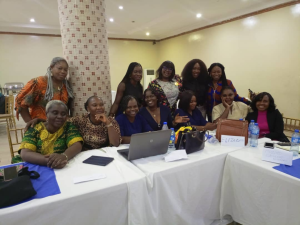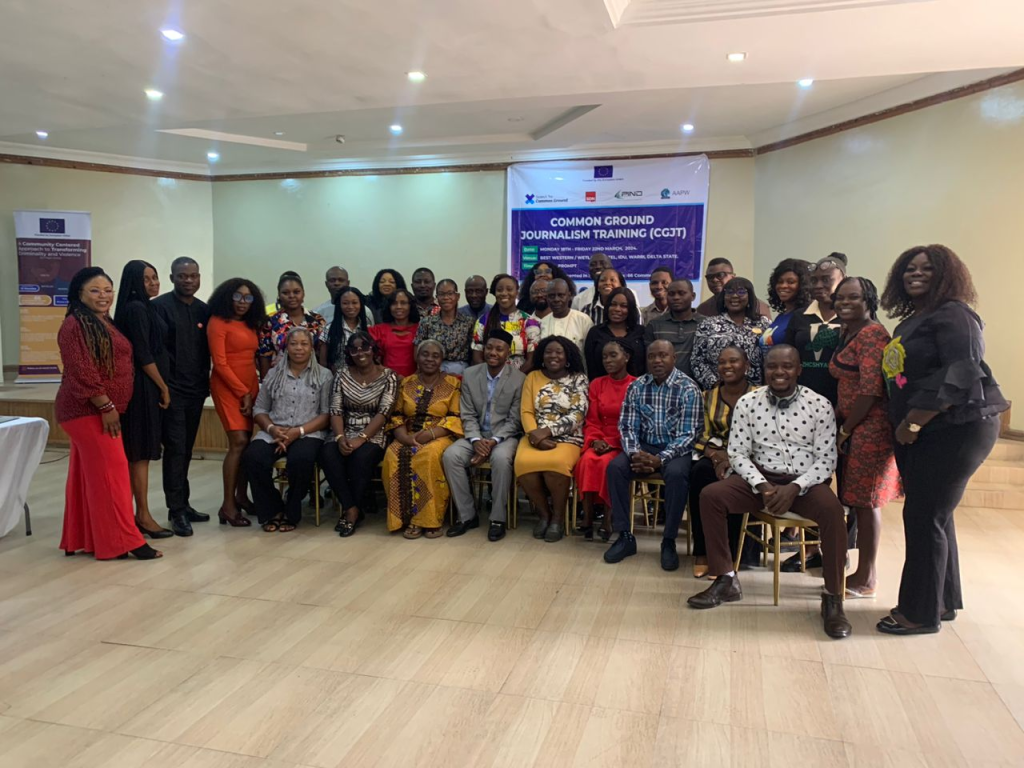Constance Meju
Journalists have been challenged to project Niger Delta reality to attract needed attention at national and international levels. The charge was made by the head of programme, Search For Common Ground, Mr Yacante Agbagadjan, at the opening of a one-week training of journalists by SFCG in Warri, Delta State, March 18-22.
Mr. Agbagadjan told the journalists selected from traditional and social media, that they occupy a special position in society to be able to help bring about positive changes to the region currently facing a myriad of challenges.
Said he, “There are a lot of issues in the Niger Delta, a lot of work to do and humanitarian and development organisations are not on ground. Show our political leaders from state to national level that they need to come and support the issues.
“There are needs in our local communities, local governments, states and the Niger Delta. Most people do not know the reality of the Niger Delta and the onus is on the media to show them our needs and how to control the problems.”
He said SFCG recognises the influence of the media and wants a partnership to project its work in the region as well as encourage other international development and humanitarian organizations to come to the Niger Delta.
“This training for journalists is not ordinary. SFCG considers the participants as key actors to the project; a bridge between SFCG and the funders. Our expectation is to build a partnership between SFCG and journalists.
“SFCG is likely the only biggest international NGO operating in the Niger Delta and wants to work with journalists to expand what was started last year – tranche of the EU pilot phase stressing that other phases will depend on activities and media escalation of the activities.
“If no media buy-in, the EU will not fund the next phase. Only the media can let them know what is being done. Build this phase and make it strong. We should come together and make the project very successful to attract donor support to the Niger Delta issues. I will be happy to see other big donors fund projects in the Niger Delta.”

He called for advocacy with international agencies and government, to redirect effort to the Niger Delta, noting that, “politicians do not have enough to address all the problems and so, need the support of civil society and the media, sharing the right information.”
He explained that the project, funded by the European Union, EU, is being implemented in partnership with Stakeholders Democracy Network, Partnership Initiatives in Niger Delta, and Academic Associates Peace Works, as part of an 18-month project covering 66 communities across 33 local government areas in three states-Bayelsa, Delta and Rivers.
The head of office stated that SFCG is committed to building peace in the Niger Delta, stressing, “SFCG will not undertake a commitment it is not sure to meet.”
He urged the journalists drawn from Edo, Delta, Bayelsa states, to shun wrong information, sexual abuse, harassment, fraud and other corrupt practices, as he harped on transparency and accountability as values SFCG upholds.
“Try to respect the principle of safeguarding. Measures are in place to protect the welfare of individuals, providing education, health, etc., services.”
He explained, “Safeguarding focuses on the vulnerable – people with disabilities? Children, the elderly. Try to avoid any violence or abuse of the vulnerable by media actors, through information shared, attitude or actions,” and added, “Show respect for the vulnerable. Report any sexual abuse or harassment case, corruption and fraud attitudes by key actors. Good behaviour is needed from the project team.”
The head of office listed some of the issues demanding attention in the region to include, peace-building, community violence, criminality, violence and, response initiatives and called for more support for community visibility around the new project.
Mr Sunny Dada, SFCG Media and Information Management coordinator, explained that the organisation is adopting a community-centred approach to conflict management.
“SFCG is trying to see how to adopt a community-based solution to the several conflict drivers in the Niger Delta, to empower community people to proffer solutions to their own problems and this will involve understanding the dynamics of conflict, the actors (aggressors and victims).”
He stressed that the focus is on finding a common ground that will produce a win-win solution, noting, “acceptable win-win solution demands their (actors) being carried along.”
According to him, the SFCG objectives include addressing the challenges of illegal oil bunkering in the Niger Delta and sea robbery (piracy) around coastal communities as well as building community confidence in the security operatives for actionable intelligence.
Anticipated changes from the project he added, include inclusive governance especially around resource management, amplified national interest in the challenges in the region while journalists would boost the process by amplifying the success stories emanating from the project.
The major focus of the training was on responsible conflict reporting to prevent conflict escalation, deepened factual report backed by data and verified online information.
Key resource person and media specialist, Mr. Temisan Etietsola, in his presentations decried the emphasis on sensation in conflict report rather than proper analytical reports that can help solve the problem.
“Reporters are not properly analysing the conflict but rather falling back on panning the number of casualties. Conflict sensitive journalism requires caution.
“You need to investigate, identify the actors, identify high spoilers of peace stirring up the actions-usually operate in shadows). You also need to identify high facilitators of peace. Provide high visibility to high facilitators of peace, highlighting the role they play against the role of spoilers to create a common ground,” he advised.
He noted that conflict tools helps you unravel the interests among the actors, not visible to the eye which, are not being mentioned, adding, “In a conflict sensitive report, it is important to draw the attention of duty bearers and policy makers to the latent factors giving birth to the conflict.”
Etietsola described the peace in the Niger Delta as negative peace with indicators of conflict like the presence of guns, bombs as opposed to positive peace where conflict indicators are absent.
He stressed that the journalist’s obligation in conflict reporting is to provide truth telling.
“Journalists’ first responsibility is to contribute towards building a nation that will dwell in peace.
“You are responsible for that report. You have conferral powers; people believe and follow you. Be sensitive to the type of guests you bring to your media houses as some guests are conflict drivers.”
Harping on the need to properly present the issues at stake to aid responsible reporting, Etietsola stated, “You also need to understand whether the issues in the conflict are generational or occur in instances. The Niger Delta conflict is generational-trauma- transferred generational trauma.”
The media specialist described conflict symbols which need to be identified in reporting as, burnt houses, environmental degradation, war museum, slavery symbols as in Black Lives Matter, etc.
Urging journalists to up their trade by becoming solution providers, he said, “Conflict sensitive journalism also contributes to peace-building through paving the way for conflict resolution and less factions. Point the way to solutions, draw the attention of duty bearers to the poverty in the region.”
Drawing from personal experiences, the mass media and Information management officer, Folashade Sheye-Ojo advised journalists to ensure they understand the varied sides to a conflict to avoid fuelling crisis, verify news sources and craft their stories in clear language to avoid ambiguity or misinformation.
Theme of the media training was, ‘A Community Centred Approach to Transforming Criminality and Violence in the Niger Delta.’

